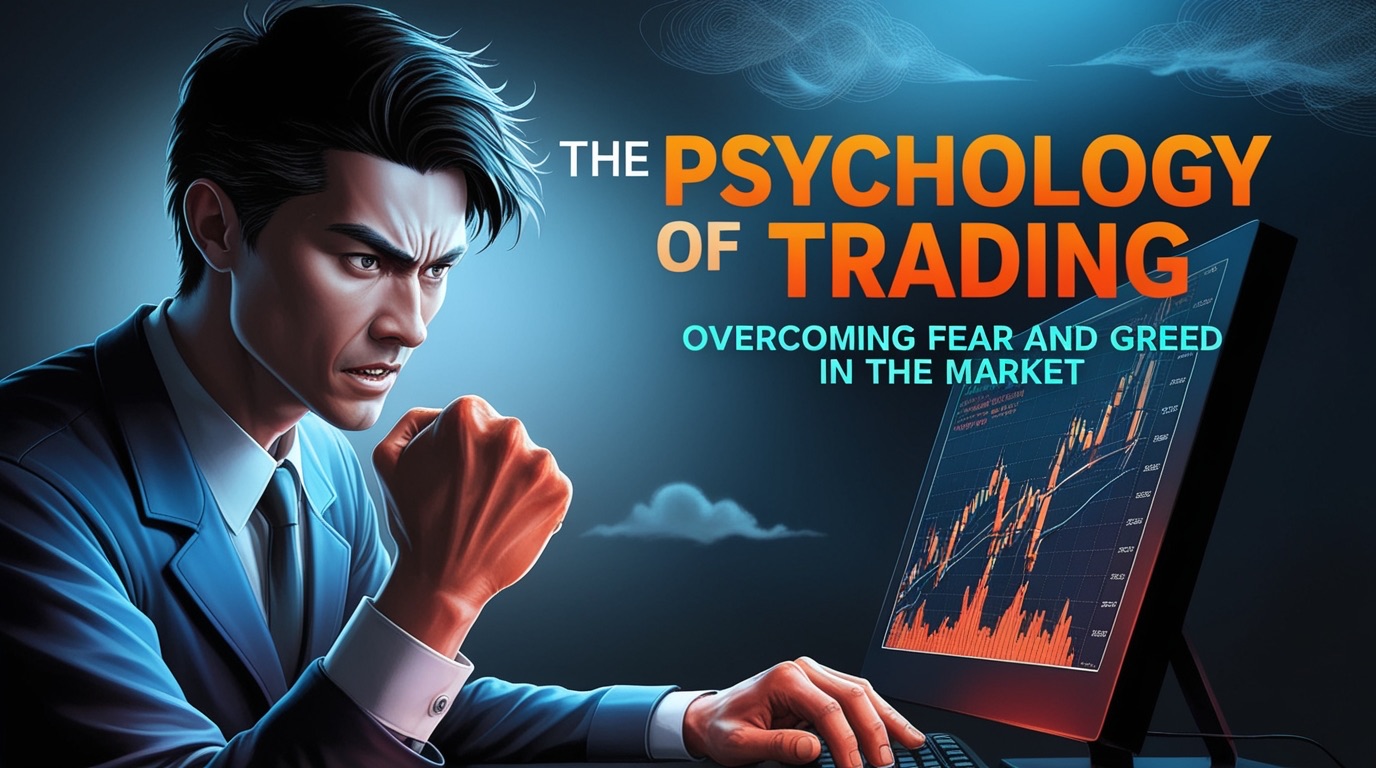Trading is a complex and emotionally charged activity, often involving significant financial risks and rewards. It demands more than just technical skills and market knowledge—successful trading requires a deep understanding of human emotions, particularly fear and greed. These emotions can have a profound impact on decision-making, often leading traders to make irrational choices that can jeopardize their success. In this post, we’ll explore the psychology behind trading, focusing on how fear and greed shape traders’ behavior and how to overcome these emotional obstacles for better outcomes.
Understanding the Psychology of Trading
Before delving into how fear and greed affect trading, it’s essential to understand the broader concept of trading psychology. Trading psychology refers to the emotional and mental factors that influence a trader’s decision-making process. The psychological aspect of trading can be just as important, if not more, than technical expertise. The financial markets are driven by human behavior, which can be unpredictable and highly emotional.
Every trade a trader makes is influenced by their emotions, personal experiences, biases, and mental state. These factors shape the decisions they make in the moment, often causing them to deviate from rational strategies. The ability to recognize and control these emotions is what separates successful traders from those who constantly fall short.
The Role of Fear in Trading
Fear is one of the most powerful emotions that traders face. It’s often triggered by the uncertainty inherent in the market, the possibility of losing money, and the risk of being wrong. Fear can paralyze traders, leading them to avoid taking risks or making decisions too late, which can prevent them from capitalizing on profitable opportunities.
Fear of Loss
The fear of loss, also known as loss aversion, is a well-documented psychological phenomenon where losses are psychologically more painful than gains are pleasurable. This makes traders more likely to avoid taking risks that could lead to losses, even if the potential for profit outweighs the risk. Loss aversion can lead to an overly cautious trading style, where a trader may miss profitable opportunities out of fear of losing money.
Fear of Missing Out (FOMO)
On the other hand, fear can also manifest as the fear of missing out (FOMO). When a trader sees others profiting from a particular trade or market movement, they might feel pressured to act quickly, even without doing proper research or analysis. This can lead to impulsive decisions that are not based on strategy but rather on the desire to avoid missing potential gains.
Overcoming Fear of Loss
Overcoming the fear of loss begins with the development of a sound risk management strategy. Successful traders know their risk tolerance and use tools such as stop-loss orders, diversification, and position sizing to limit their exposure to significant losses. Having a clear exit plan before entering a trade can help mitigate the fear of losing, providing traders with a sense of control.
Additionally, focusing on the long-term picture can reduce the psychological impact of individual losses. No trader wins every single trade, and accepting this reality is crucial for overcoming the fear of loss. Traders who view losses as part of the learning process are better equipped to handle the psychological challenges of trading.
The Impact of Greed in Trading
Greed is another powerful emotion that influences trading behavior. It’s driven by the desire for more—more profit, more success, and more recognition. In trading, greed can manifest in several ways, all of which can negatively affect decision-making and performance.
Overtrading
Greed often leads to overtrading, where traders make excessive trades in an attempt to generate more profits. Overtrading can result from the desire to take advantage of every opportunity in the market, even if the trade doesn’t align with the trader’s strategy. This impulse to trade more can result in significant losses, as the trader takes on more risk than they can handle.
Risking Too Much
Another way greed manifests in trading is by risking too much on a single trade. Traders driven by greed may increase their position sizes or take on more leverage than they can afford in an attempt to maximize profits. However, this can quickly backfire, leading to substantial losses that wipe out gains from earlier trades.
Chasing the Market
Greed can also lead traders to chase the market, jumping into trades based on recent trends or market noise rather than sound analysis. This can result in buying at the top of a market rally or selling at the bottom of a downturn. Chasing the market is a sign of emotional decision-making and can result in poor trade execution and significant losses.
Overcoming Greed
The key to overcoming greed in trading is discipline. Traders need to develop and stick to a well-defined trading strategy that includes clear entry and exit points. A trading plan should also set limits on how much risk a trader is willing to take on any single trade, which can prevent the temptation to overextend.
Risk management plays a crucial role in combating greed. By setting stop-loss orders and ensuring that risk is kept within acceptable levels, traders can prevent greed from leading them into dangerous territory. Regularly reviewing and adjusting risk management strategies based on performance can help maintain a balanced approach to trading.
The Psychological Effects of Market Volatility
Market volatility—characterized by rapid and significant price movements—can trigger both fear and greed in traders. Fear of losing money during a volatile market can lead to panic selling or decision paralysis. Conversely, the potential for large profits in a volatile market can fuel greed, causing traders to take on excessive risk.
Navigating Volatility
Traders who understand how volatility impacts their emotions are better prepared to handle its psychological effects. One effective strategy is to avoid trading during periods of high volatility unless the trader is well-prepared and experienced in managing such conditions. Traders can also use tools like volatility indicators and technical analysis to help identify market conditions that are more conducive to stable, predictable trades.
Another approach is to remain calm and stick to the trading plan. Having predetermined strategies for dealing with market volatility, such as scaling into positions or using wider stop-loss levels, can help traders maintain emotional control during turbulent times.
Cognitive Biases in Trading
In addition to fear and greed, traders must also contend with a variety of cognitive biases that can cloud judgment and lead to irrational decisions. Some of the most common biases include:
Confirmation Bias
Confirmation bias occurs when traders seek out information that supports their existing beliefs or positions while ignoring contradictory evidence. This can lead to overconfidence in a particular trade and cause a trader to hold onto a losing position for too long.
Overconfidence Bias
Overconfidence bias is when traders believe they know more than they actually do or believe their judgment is superior to others. Overconfident traders often take excessive risks or ignore proper risk management strategies, which can lead to significant losses.
Anchoring Bias
Anchoring bias occurs when traders place too much weight on a particular piece of information or reference point. For example, they may become fixated on a past price level and make decisions based on that, rather than on the current market conditions.
Overcoming Cognitive Biases
Overcoming cognitive biases requires self-awareness and mindfulness. Traders should regularly review their decision-making process and question whether biases are influencing their trades. Keeping a trading journal can help identify recurring patterns of biased thinking and provide insight into how emotions are affecting performance.
Using objective criteria, such as technical indicators and data-driven analysis, can also help mitigate the impact of cognitive biases. Developing a system that focuses on evidence-based decisions rather than emotional impulses is key to successful trading.
Building Mental Resilience for Trading
Developing mental resilience is essential for overcoming fear and greed in trading. Traders need to be able to bounce back from losses, maintain focus during periods of high volatility, and stick to their strategies despite emotional impulses.
Practicing Mindfulness
Mindfulness is a powerful tool for managing emotions and building mental resilience. By being present and aware of their emotional state, traders can recognize when fear or greed is influencing their decisions. Mindfulness techniques, such as deep breathing and meditation, can help traders regain focus and calm their minds.
Setting Realistic Expectations
Traders should set realistic expectations for their performance. Understanding that losses are a part of trading and that no trader is perfect can help mitigate feelings of fear and disappointment. By focusing on long-term goals and progress rather than short-term wins and losses, traders can maintain a healthy mindset.
Emotional Detachment
One of the most effective ways to manage fear and greed is through emotional detachment. Successful traders understand that the market is unpredictable and that individual trades do not define their success. By detaching emotionally from each trade and focusing on the overall strategy, traders can reduce the psychological impact of both gains and losses.
Conclusion
The psychology of trading plays a critical role in a trader’s success. Fear and greed are two of the most powerful emotions that can drive decision-making and influence trading behavior. By understanding how these emotions impact trading, developing a strong risk management plan, and building mental resilience, traders can overcome these emotional obstacles and improve their chances of success in the markets.
Successful traders know that the key to long-term profitability lies not just in technical analysis or market knowledge, but in their ability to manage their emotions. By recognizing the impact of fear and greed and employing strategies to control them, traders can make more rational decisions and achieve their financial goals.
FAQS
How does fear affect trading decisions?
Fear in trading often leads to hesitation or avoiding taking risks, which can cause traders to miss profitable opportunities. It can also result in panic selling when market conditions turn unfavorable.
What is the impact of greed on trading?
Greed can drive traders to take excessive risks, overtrade, or ignore their risk management strategies, leading to significant losses. It often results in chasing the market or risking too much on a single trade.
How can you manage fear when trading?
Managing fear involves developing a solid risk management strategy, setting stop-loss orders, and maintaining a long-term perspective. Acceptance of losses as part of the process can help reduce fear and make more rational decisions.
What are cognitive biases in trading?
Cognitive biases, such as confirmation bias and overconfidence, can distort decision-making by causing traders to favor information that supports their existing beliefs or make over-optimistic predictions. These biases often lead to poor judgment and avoidable losses.
How can mindfulness help in trading?
Mindfulness helps traders stay focused and aware of their emotional state, reducing the impact of fear and greed. It encourages traders to remain calm, make rational decisions, and stick to their strategies even in volatile markets.










